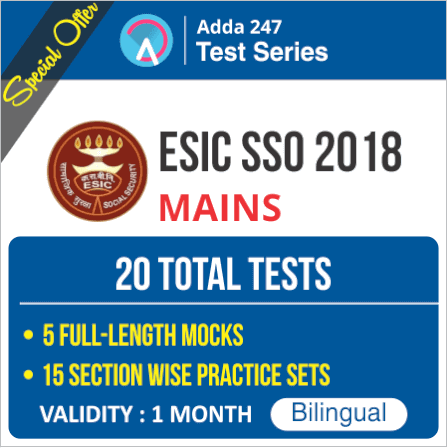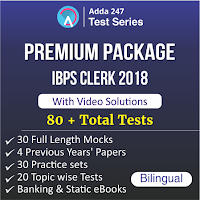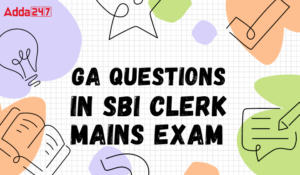Table of Contents
IBPS PO Mains 2018 Exam Analysis:
Dear Aspirants,
Today (18th November) was the IBPS PO Mains 2018 Examination. After the Phase-I Prelims, this was the much-awaited exam for all the candidates aiming to become a Probationary Officer in a PSB, and here is the complete exam analysis and review of today’s IBPS PO Mains 2018.
IBPS PO Mains 2018 exam had two parts; first was the objective test of 200 marks which had 4 sections Data Analysis and Interpretation, English Language, Reasoning and Computer, and General Awareness(with special reference to banking) for a duration of 3 hours and each section had its allotted time limit. The second was a descriptive test of 30 minutes which had Letter and Essay writing collectively for 25 marks. The level of Today’s exam was difficult and lengthy. Out of all the sections, Data interpretation and analysis was most time taking and calculative, and there were many new pattern based question in the English Section however they were do-able if one reads the directions carefully. Read the detailed analysis provided below for more insight into what types of questions were asked in all the sections of 2018’s IBPS PO Mains examination.
IBPS PO Mains 2018 Exam ANALYSIS (OVER-ALL):
| SECTIONS | GOOD ATTEMPTS |
|---|---|
| English Language | 12-17 |
| Reasoning & Computer Aptitude | 15-19 |
| Data Analysis and Interpretation | 07-11 |
| General Awareness | 22-24 |
| TOTAL | 67-76 |
DATA ANALYSIS AND INTERPRETATION (Difficult- Lengthy)
The level of data analysis and interpretation was difficult. There were many shorts sets of DIs and many questions of Data Sufficiency. Each short caselet type DI had a set of statements with some data and 1 or 2 questions each and along with short DIs there were also following types of main DIs:
- Radar
- Caselet
- Line and Tabular DI
The number series were also of a different pattern wherein a question a series was given for reference and a candidate had to identify the logic from the given series and had to complete another series given in the question along with finding the (n)th term.
There was also a twist in the arithmetic word problem questions. A question had some data and accompanied by a set of questions numbered- (a), (b), (c).. and candidates had to solve those and identify that a solution can be found for which among those given questions.
The questions were:
| Topic | No. of Questions | Level |
|---|---|---|
| Data Interpretation | 18 | Difficult- Lengthy |
| Data Sufficiency | 5 | Lengthy |
| New Pattern Number Series | 3 | Moderate-Difficult |
| LCM, HCF | 1 | Moderate-Difficult |
| Mensuration | 1 | Moderate-Difficult |
| Time and Work | 1 | Moderate-Difficult |
| Speed Time and Distance | 1 | Moderate-Difficult |
| Miscellaneous- Arithmetic Word Problems | 5 | Difficult-Lengthy |
| Total | 35 | Difficult-Lengthy |
ENGLISH LANGUAGE (Difficult)
This section packed in a punch for all the aspirants who appeared in this examination. There were many new types of questions. Clearly, this year’s IBPS PO Mains has set a new trend for English Language section to bring up the importance of reading and analytical ability. Till now candidates were used to dealing with a single big passage accompanied by a set of 5-7 questions as Reading Comprehension for this section in bank exams but in IBPS PO Mains 2018 there were many short passages having 2-3 questions each. As per the review shared with us by the students who have appeared for this exam, there were around 5 to 6 short RCs and the topic Reading Comprehension had a major portion of around 20 questions out of a total of 35 in the English Language Section. All the passages were based on economy-related articles.
The cloze test and sentence rearrangement questions in this exam were also of a different pattern. It is important that candidates invest time in reading the directions very carefully because although the questions were of a different pattern but were do-able if you understand the direction given.
| Topic | No. of Questions | Level |
|---|---|---|
| Reading Comprehension | 21 | Moderate-Difficult |
| Cloze Test (New Pattern) | 10 | Difficult |
| Sentence Rearrangement | 4 | Difficult |
| Total | 35 | Difficult |
REASONING AND COMPUTER APTITUDE ( Difficult )
The level of reasoning was difficult. There were NO questions about computer aptitude. Following were the questions of puzzles and seating arrangement:
- Triangular Seating Arrangement, 6 people and their pets
- Rectangular Seating Arrangement, direction, and distances were also given
- Linear seating arrangement with an uncertain number of people
In the reasoning ability section of this year’s IBPS PO Mains, there were numerous short puzzles having 1 or 2 question each. A major portion of this section was filled with questions of puzzles and data sufficiency.
The questions were:
| Topic | No. of Questions | Level |
|---|---|---|
|
Sitting Arrangement and Puzzles
|
23
|
Difficult
|
| Machine Input Output
|
3 | Moderate-Difficult |
|
Alphabet
|
1
|
Moderate
|
|
Coding Decoding
|
3
|
Moderate-Difficult
|
|
Logical Reasoning
|
10
|
Difficult
|
|
Miscellaneous
|
5
|
Moderate- Difficult |
|
Total
|
45 | Difficult |
GENERAL AWARENESS (Moderate)
This section had 40 questions and the level of the questions asked was moderate. Most of the questions in this section were covering the current affairs and news of May – Nov Months. As per the review shared by students who appeared for this exam, there were only a few questions from static and banking awareness.
DESCRIPTIVE TEST
This section was of 25 marks with a time limit of 30 minutes. Candidates had to choose from given 5 options to write a letter and an essay.
Letter Writing (150 words)
a) Write a letter to the editor on types of pollution and how to reduce it.
b) Write a letter to your neighbor thanking them for their help in the hour of need.
Essay Writing (200 words)
a) Fake-News





 PNB SO Exam Analysis 2024, 31 March Exam...
PNB SO Exam Analysis 2024, 31 March Exam...
 NICL AO Exam Analysis 2024, 4 March Ques...
NICL AO Exam Analysis 2024, 4 March Ques...
 GA Questions Asked in SBI Clerk Mains Ex...
GA Questions Asked in SBI Clerk Mains Ex...



